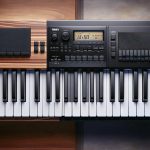Deciding between a keyboard and a digital piano can be a bit of a head-scratcher for beginners. Both instruments offer unique benefits, but it's their differences that will ultimately help you hit the right note in your musical journey. Whether you're dreaming of serenading with classical pieces or rocking out with modern hits, choosing the right instrument is crucial.
Keyboards are celebrated for their versatility and portability, appealing to those who love experimenting with different sounds and rhythms. On the flip side, digital pianos aim to closely mimic the touch and feel of acoustic pianos, making them a favorite among classical music enthusiasts and those seeking an authentic piano experience. Let's dive into the world of keys and hammers to discover which instrument strikes a chord with beginners.
Understanding Keyboard Features
When stepping into the world of music, beginners often find themselves mesmerized by the range of features keyboards offer. Unlike digital pianos that focus on emulating the acoustic piano experience, keyboards shine in their versatility and array of functions, making them an adventure playground for those who love to explore different sounds and rhythms.
One of the key attractions of keyboards is their built-in library of sounds and instruments. Players can switch from grand piano tones to strings, brass, and even synths with the press of a button. This variety not only enriches the playing experience but also opens up a world of musical genres for beginners to explore. Whether it’s jazz, rock, or electronic music, there's a sound for every style hidden within the keyboard's digital arsenal.
Another feature that sets keyboards apart is their portability. Unlike the bulky digital pianos, keyboards are generally lightweight and compact, making them perfect for musicians on the go. This portability encourages beginners to practice anytime, anywhere, which can significantly boost their learning curve.
Rhythm and Accompaniment Features are also pivotal in keyboards, offering beginners an opportunity to play along with pre-recorded drum beats and backing tracks. This not only makes practice sessions more engaging but also helps in developing timing and rhythm skills. For those who aspire to write their own music, these features can be invaluable tools for composing and arranging.
Here’s a look at some common features found in most keyboards:
- Multiple Instrument Sounds: From pianos to strings and drums, keyboards offer a range of sounds.
- Built-in Rhythms and Accompaniments: Background tracks to play along with.
- Recording Functionality: Allows players to record and playback their performances.
- MIDI Compatibility: Enables the keyboard to connect with computers and other MIDI devices for music production.
The inclusion of educational features in many keyboards is another boon for beginners. With built-in lessons, light-up keys, and interactive apps, learning to play has never been easier. These tools are designed to make the learning process both effective and enjoyable, paving the way for beginners to progress quickly in their musical journey.
Moreover, keyboards often come equipped with a range of effects like reverb and chorus, allowing players to experiment with their sound. This not only enhances the musical experience but also fosters creativity and personal expression.
Exploring Digital Piano Advantages

When considering the options for a beginner musician, digital pianos offer remarkable advantages that cater specifically to those aiming to learn and master the piano. Unlike keyboards, which are known for their versatility and array of sounds, digital pianos focus on emulating the acoustic piano experience with precision. This approach to design provides learners with a true-to-life piano feel, which is essential for developing the proper techniques from the start.
One of the most notable benefits of digital pianos is their weighted keys feature. Weighted keys mimic the resistance felt when pressing the keys of an acoustic piano, providing an authentic playing experience. This is crucial for beginners who are building their finger strength and dexterity, as it allows them to transition to an acoustic piano with ease should they choose to in the future.
Sound quality in digital pianos is another area where they shine. Manufacturers of digital pianos invest heavily in sampling technology to ensure that the sound produced is as close as possible to that of a grand piano. This means beginners can enjoy a rich and resonant sound that inspires continuous practice and improvement. Moreover, the ability to connect headphones allows students to practice without disturbing others, making it perfect for home use.
Digital pianos also come equipped with a variety of learning tools and features designed to aid beginners. Many models include built-in metronomes, record and playback functions, and even lesson programs. These features enhance the learning experience, allowing beginners to monitor their progress and work on areas that need improvement without the constant need for a teacher’s presence.
The aesthetic appeal of digital pianos cannot be overlooked either. They often resemble traditional pianos, lending an air of seriousness and sophistication to any room they occupy. For beginners, having an instrument that feels and looks professional can be incredibly motivating, reinforcing their commitment to learning and practicing regularly.
Finally, the maintenance aspect of digital pianos is considerably less demanding compared to their acoustic counterparts. There’s no need for regular tuning, and the risk of damage from environmental factors like humidity and temperature is significantly reduced. This reliability means beginners can focus solely on their practice without worrying about the instrument's condition deteriorating over time.
Digital pianos represent a focused choice for beginners passionate about learning the piano. They offer a blend of authenticity, functionality, and convenience that not only supports but also encourages the musical journey from the outset.
Key Differences in Sound Quality

When beginners are choosing between a keyboard and a digital piano, one of the most significant considerations is the sound quality. While both instruments are electronic, their sound production and quality vary greatly, affecting the learning and playing experience.
Digital pianos are designed to emulate the sound of an acoustic piano as closely as possible. They incorporate sampled sounds from real grand pianos, offering a rich and authentic tone. Advanced digital pianos use sophisticated technology to replicate the nuances of acoustic piano sounds, including the resonance of the strings and the depth of the hammer action. This results in a sound that’s not only beautiful but also dynamically responsive to the player's touch.
In contrast, keyboards often prioritize a wide array of sounds and effects over replicating the sound of a traditional piano. They come with hundreds, sometimes thousands, of different tones and rhythms ranging from orchestral instruments to modern electronic sounds. While this variety can be fun and encourage creativity, it's worth noting that the piano tones in keyboards might not have the same depth and realism as those in digital pianos. They often rely on simpler sound synthesis methods, which can result in less nuanced piano sounds.
The sound output mechanism also plays a role in the overall sound quality. Digital pianos typically feature built-in speakers that are larger and offer better sound projection compared to keyboards. This difference means that digital pianos can produce a fuller, more resonant sound even at lower volumes. Keyboards, with their more compact and portable design, have smaller speakers. As a result, the sound might seem thinner and less satisfying, especially for beginners who are still developing their ear for piano tones.
For learners who aim to develop a serious understanding and appreciation of piano music, the superior sound quality of digital pianos provides a more inspiring and authentic experience. On the other hand, beginners with a keen interest in exploring a variety of musical genres and sounds may find the diverse offerings of keyboards more appealing.
Both digital pianos and keyboards offer unique benefits in terms of sound quality. It’s essential for beginners to consider what aspects of sound are most important to them in their learning and playing journey. Whether it’s the authenticity and depth of a digital piano or the versatility and variety of a keyboard, choosing the right instrument can significantly influence a beginner's motivation and progress in mastering the piano.
Portability and Durability Comparison

When considering a musical instrument like a keyboard or digital piano, beginners often overlook portability and durability. However, these factors can significantly influence a musician’s practice routines and performance opportunities. Keyboards are generally lighter and more compact compared to digital pianos, making them a favorite for musicians on the move.
Keyboards, with their streamlined design, weigh significantly less than most digital pianos. This makes them easier to transport from one location to another. They can be effortlessly packed into a carry case and taken to lessons, gigs, or even on vacation. This portability allows beginners to practice anywhere, which can greatly enhance their learning curve.
Digital pianos, on the other hand, are designed to emulate the feel and sound of an acoustic piano. This often means they come with a heavier build to accommodate the necessary technology and weighted keys. Weighted keys are crucial for developing the correct finger technique and dynamics in piano playing. While this aspect favors the authenticity and quality of the play, it does make digital pianos less portable.
To put things into perspective, here's a basic comparison of weights between typical keyboards and digital pianos:
| Type | Average Weight |
|---|---|
| Keyboard | 10-20 lbs |
| Digital Piano | 100-300 lbs |
Durability is another critical factor. Keyboards tend to be made from lighter materials, which, while contributing to their portability, may not always offer the same level of durability as digital pianos. The plastic components of a keyboard can be susceptible to damage if not handled with care. On the contrary, digital pianos are constructed to be more robust. With wooden or metal frames, they are designed to withstand more rigorous use. This makes them a suitable option for those looking for an instrument that can endure years of practice.
However, it's essential to note that the durability of an instrument also greatly depends on how it's treated. Regular maintenance and careful handling can extend the life of both keyboards and digital pianos significantly.
- Keyboards offer convenience in terms of easy mobility but might require more delicate handling.
- Digital pianos provide a more authentic playing experience with their weighted keys and are built to last but are less convenient to transport.
Making the Right Choice as a Beginner

Choosing between a keyboard and a digital piano can be a pivotal moment for beginners. It's not merely about selecting an instrument; it's about picking a partner for the musical journey ahead. For novices, understanding the nuances between keyboards and digital pianos helps tailor the learning experience to individual needs and goals.
Keyboards stand out for their ease of use and accessibility. They're often the go-to for beginners due to their versatility and the variety of sounds and rhythms they offer. With features like built-in lesson modes and light-up keys, keyboards present an engaging learning path for those just starting out. They're also more budget-friendly, which is crucial for beginners not yet ready to invest heavily in an instrument.
On the flip side, digital pianos provide a more authentic playing experience, closely mimicking the touch and feel of an acoustic piano. For beginners whose aim is to develop strong foundational skills, particularly in classical or jazz music, the weighted keys of a digital piano can be invaluable. They simulate the resistance of an acoustic piano, offering a better understanding of dynamics and finger strength.
Here's a quick comparison to help beginners weigh their options:
| Feature | Keyboard | Digital Piano |
|---|---|---|
| Portability | Lightweight and easy to transport | Heavier and less portable |
| Feel and Response | Light and unweighted keys | Weighted keys for an authentic feel |
| Variety of Sounds | Hundreds of options | Fewer, more piano-focused sounds |
| Cost | Generally more affordable | Higher initial investment |
When making the decision, beginners should consider their space, budget, and the kind of music they're drawn to. Those with limited space or who envision themselves playing in various locations might find keyboards more appealing. Meanwhile, learners with a dedicated space and a passion for classical music might benefit more from the qualities of a digital piano.
Another crucial factor is the learning curve. Keyboards can offer a fun and less intimidating start with their plethora of sounds and interactive learning features. However, digital pianos, with their focus on piano sounds and weighted keys, encourage skill development that's transferable to acoustic pianos.
Conclusion
Choosing between a keyboard and a digital piano ultimately boils down to what a beginner values most in their musical journey. If they're after something portable, budget-friendly, and with a variety of sounds, keyboards are the way to go. However, for those focused on building a strong foundation with a feel closer to an acoustic piano, digital pianos offer that authentic experience. It's about balancing needs and preferences. Whatever the choice, the important thing is to start playing and enjoy the process of making music.
Harlan Kilstein began playing piano during covid with no piano background at all. He taught himself how to play learning what to do and what not to do.
Today he's an advanced intermediate player and can help you grow in your skills because he learned all this on his own.








